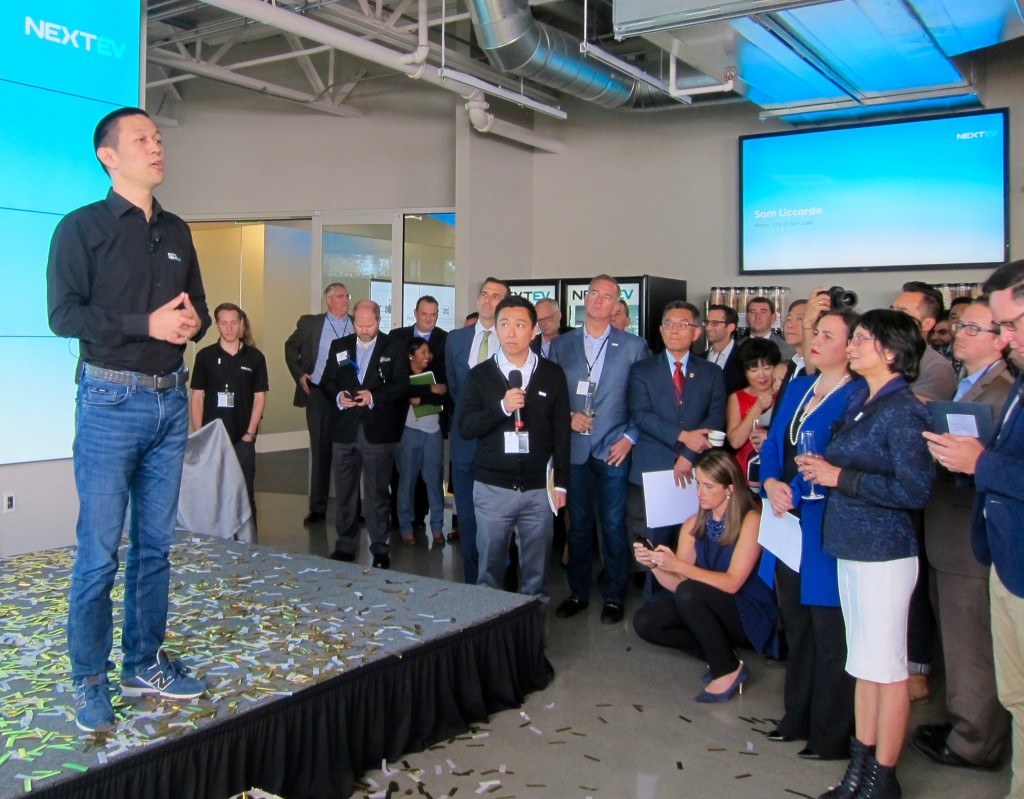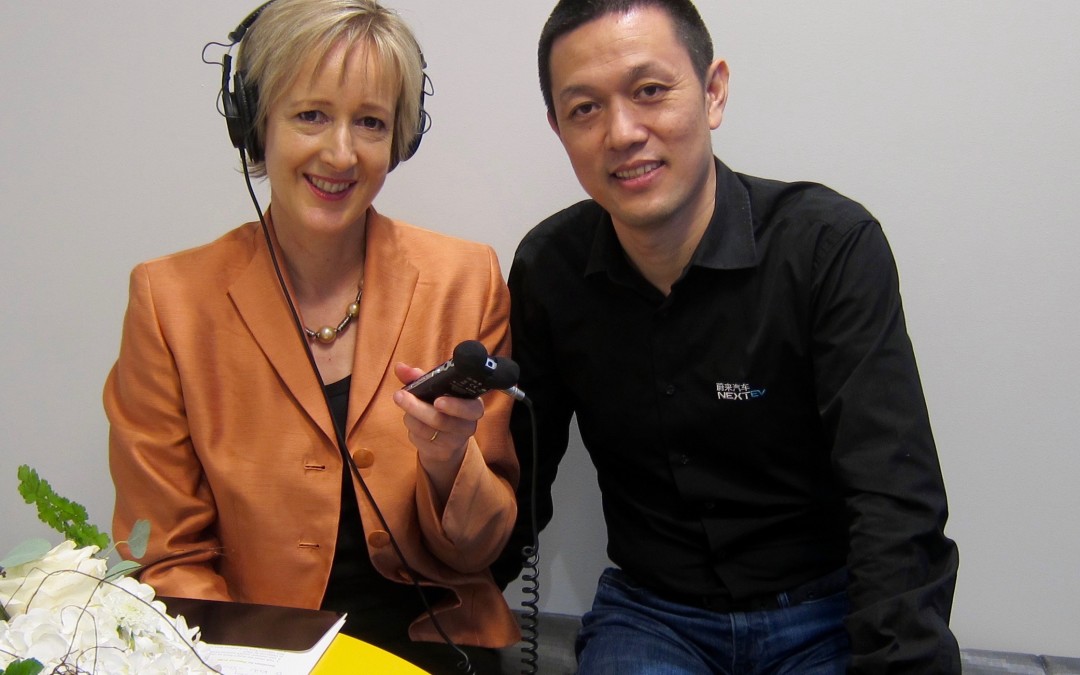By Alison van Diggelen, host of Fresh Dialogues
The race to build the “ultimate” electric car is heating up. Every month, it seems another electric car company joins the fray to offer a car stylish enough to attract the Tesla crowd, and affordable enough to meet the growing demand from China, the United States and Europe.
NextEV stands out from the crowd for two reasons:
- It has solid backing, from a broad range of top venture capital and Internet companies like Sequoia and Tencent.
2. Its Silicon Valley R&D facility is led by Padmasree Warrior, “The Queen of the Electric Car” and she’s rapidly attracting top tech talent from the likes of Tesla and Apple.
Last month, I attended the grand opening of NextEV Silicon Valley and interviewed its founder, William Li. He shared his “Blue Sky” ambition (he means it literally) and how his grandfather inspired him to go from cattle herder to Internet multi-millionaire. It was the first interview he’d ever done in English. I filed this report for the BBC World Service’s Tech Program, Click.
Here’s a transcript from today’s program, with some great insights from host Gareth Mitchell and BBC contributor, Bill Thompson. The transcript has been edited for length and clarity:
BBC Host, Gareth Mitchell: One event that did happen was the recent launch of yet another electric vehicle outfit in California. This is the Silicon Valley division of a Chinese startup called NextEV. The champagne flowed and the ribbon was cut – the digital ribbon – but our reporter Alison van Diggelen was most interested in the economics of it all. You don’t need to be an investor to know just how risky these ventures are as the technology gradually matures. In California and China state funding and tax breaks are all part of getting these businesses off the ground. Alison tracked down NextEV founder, former cattle herder and now big time entrepreneur, William Li.
Alison van Diggelen: At NextEV’s Silicon Valley launch, William Li confirmed that on November 21st, NextEV will reveal its first supercar in London. The electric car is expected to offer a 0-60 acceleration in under three seconds. Its Formula E racing team has used a dual-motor setup on its race car, and it’s likely to be a feature of the supercar. (The top speed of the sleek two-seater will be over 180 mph, and its price is likely to be equally extravagant!)
NextEV is late join to the electric car race. So how does Li intend to challenge Tesla and the dozens of electric car companies popping up worldwide?
William Li: Tesla is a great company, I respect them. But Tesla was founded 2003. Lots changed. It’s a mobile internet era. We can do better to communicate with our users, give our users a much better holistic user experience.
He aims to do for the car what Apple did for the smart phone.
 He learned a lot about user experience from Bit Auto, a popular web portal in China and his first business success. He’s now built a global startup – with facilities in Beijing, Shanghai, Silicon Valley, London and Munich. The global workforce is 2000.
He learned a lot about user experience from Bit Auto, a popular web portal in China and his first business success. He’s now built a global startup – with facilities in Beijing, Shanghai, Silicon Valley, London and Munich. The global workforce is 2000.
In Silicon Valley, its 250-strong team of auto and software experts is growing rapidly. U.S. CEO Padmasree Warrior – former CTO at Cisco – is hiring experts in artificial intelligence, voice interaction and user interface from the likes of Tesla, Apple and Dropbox. Warrior says they’re already working on affordable cars for China’s burgeoning demand.
Padmasree Warrior: In China, There’s a large shift happening … Environment issues are driving the government to look at electric vehicles as part of the solution… It’s healthier for the environment to drive an electric vehicle.
China is offering generous tax incentives to electric carmakers and consumers, driving a flood of companies into the space. NextEV recently signed an agreement with the Nanjing Municipal Government in China, to build a $500 million factory to build electric motors.
Similarly in Silicon Valley, a fleet of electric car companies has chosen to locate here, thanks to state tax incentives and the strong talent base. These include Tesla, Atieva, and Le Eco.
I spoke with California’s Director of Economic Development, Panorea Avdis. She explained how state policy is helping reduce greenhouse gas emissions, by focusing on the tech industry…
Panorea Avdis: The goal is to have 1 million electric zero emission vehicles on the road by 2020.
(Today, California has about 300,000 electric cars, about half of the nation’s total.)
Alison: NextEV secured $10M in tax credits. Tell me why that’s cost effective for the people of California.
Panorea Avdis: The return on investment…nearly 1000 jobs in the next 5 years, speaks for itself. California is leading the way, there’s no other state in the union that has this type of aggressive polices and it’s really inspiring this innovation in technology to come forward.
But making cars is notoriously hard. News broke this month that Apple is shelving its electric car plans to focus on self-driving software.
William Li knows it’s a tough road ahead. He gives his company just over a 50% chance of success.
As a boy, Li was a cattle herder in China. He’s come a long way and credits his grandfather’s wisdom:
William Li: [Speaks first in Mandarin ] The journey is more important than the result. So follow your heart….your original wish. Don’t worry about failure.
Like Tesla’s Elon Musk, Li is concerned about climate change and also the dense smog in Beijing and Shanghai. He blames polluting gas-guzzling cars.
NextEV’s brand in China is called “Way-Lye”
William Li: It means blue sky coming. That’s my original wish.
It’s an ambitious goal that could be a very long way off, especially in China’s congested and polluted cities.
Gareth Mitchell: That’s Alison van Diggelen reporting from Silicon Valley. So Bill Thompson – the journey is more important that the result?
Bill Thompson: The result is much more important than the journey here, because unless we get much cleaner public and personal transport, then we’re in big trouble. It’s really good to see another serious entrant in this market. It’s not sewn up yet by anyone. As we heard there about Tesla, there’s no first mover advantage because the technology is developing so quickly.
We know Padmasree Warrior’s reputation for delivering. She’s been on the show a few years back. She was senior at Motorola, then went to Cisco. They’ve got really good people.
But the really interesting part of this is what happens in China. In China because they have much more control over what people can do. The government can actually mandate a move to electric vehicles much more easily than they ever could in California and that gives a great market. So NextEV may be getting money and expertise over in Silicon Valley, but it’s what happens in China that’s really interesting.
Gareth Mitchell: I was interested in the economics side of the piece: the reliance partly on state funding to get these businesses going.
Bill Thompson: Occasionally state funding helps. You might have heard of this little thing called the Internet, kicked off with defense department funding from the US. It did pretty well by being able to rely on that funding for a critical period while it developed and then was able to be used by the private sector. One or two of these examples of it actually working…




